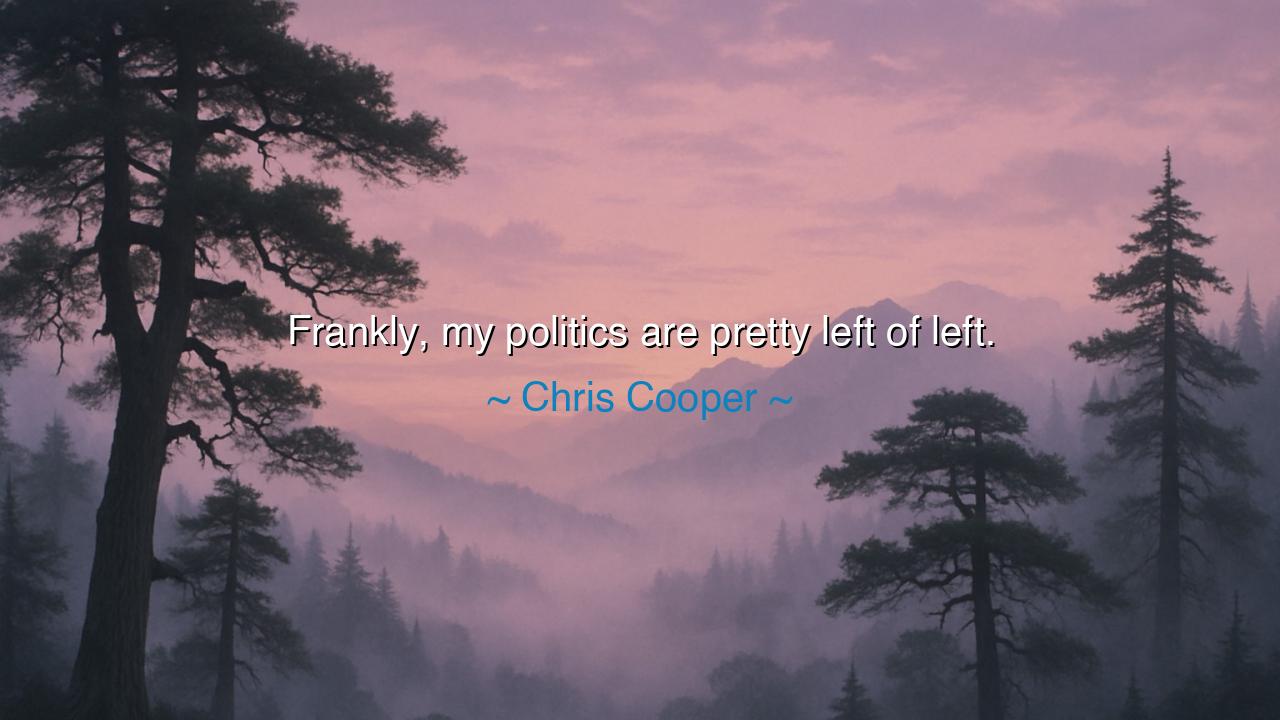
Frankly, my politics are pretty left of left.






Hear, O children of conviction, the candid words of Chris Cooper: “Frankly, my politics are pretty left of left.” In this simple yet forceful admission, he declares himself aligned not with the center, nor even with the common left, but beyond—toward the far reaches of idealism where justice, equality, and radical compassion burn brightest. It is a confession of identity, spoken without shame, as if to say: Here is where I stand, and I will not hide it.
For to be left of left is to reject not only conservatism but also the timid compromises of moderate progress. It is to believe that the world demands not small changes, but great ones—that the chains of inequality, oppression, and greed must be broken, not merely loosened. Cooper’s words remind us that such a stance is not madness, but the persistence of vision: a refusal to accept the world as it is, when one sees what it might yet become.
History has shown the power of those who stood beyond the mainstream. Consider the abolitionists of America, who were once mocked as extremists for demanding the end of slavery. While politicians counseled patience and compromise, they cried out for justice, “left of left” in their time. Yet it was their passion that prepared the way for freedom, and their uncompromising vision that history vindicated.
So too in the struggles of the twentieth century. The suffragettes, demanding votes for women, were dismissed as radicals. Yet their courage, arrests, and hunger strikes revealed that to be “too far left” in the eyes of society is often to be exactly where truth and justice dwell. The world changes not by moderation alone, but by those willing to stand at the edge, calling humanity forward.
Therefore, O seekers of wisdom, let this be your lesson: do not fear to be called “too much.” For the boundaries of politics shift with time, and what is “left of left” today may be the common truth of tomorrow. Cooper’s words remind us that conviction must be spoken plainly, even when it places us outside the comfort of the crowd. For the progress of nations depends not on those who drift with the current, but on those who row against it with unyielding strength.






DPDung Pham
Chris Cooper’s statement seems to embrace a more extreme or unconventional viewpoint. But does it help or hinder the overall political discourse? Could identifying too strongly with one side of the political spectrum alienate those in the middle who are looking for more balanced, pragmatic solutions? It’s important to consider how extreme positions impact the potential for collaboration and progress in a society that needs unity more than ever.
BHNguyen Bao Han
Being 'left of left' sounds like a bold statement. What exactly does that mean in practice? Are we talking about radical social change, or is it more about challenging existing structures in ways that others on the left may not? How do these far-left positions fit into the broader conversation around political reform and progressive action? I’d love to understand more about how people with these views see their role in the larger political landscape.
MMPhan Sy Minh Manh
It’s refreshing to hear someone embrace such a clear stance on their politics, but it makes me wonder, how does being 'left of left' actually play out in real-world politics? Are there practical implications to holding such views, especially in a climate where compromise is essential? Could these positions be seen as too radical for mainstream politics, or do they push us towards meaningful change?
KMKhanh My
Chris Cooper’s quote definitely raises some questions about the political spectrum. What does it mean to be 'left of left,' and how do we measure that? Can there be a clear line where politics become so far left that they start to conflict with mainstream leftist ideals? I’m curious about how those on the far left engage with others who may not share such extreme views. Is there room for compromise, or is the divide too wide?